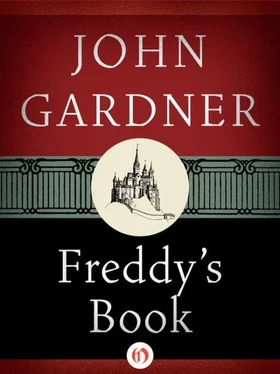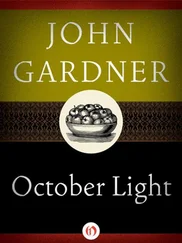All this, in spite of the rage in her heart, she spoke calmly. Lars-Goren, on his side, though he now understood that the ghost was incapable of doing him harm, was like a man with the wind knocked out of him; try as he might, he could not draw breath or speak. Whether it was rage or horror he felt, it had nothing directly to do with the old woman. “So this is then devil!” he thought. “So this is existence!”
But Bishop Brask, the great cynic and disbeliever, felt nothing of the kind. He had known for many years that the world is full of sickness and evil. He was thinking of how Lars-Goren had left his family and home, riding to his almost certain death or at any rate a bitter life of exile. If he was guilty, and he was, he was guilty in the same way the angry old witch had been: a victim of chance and unreason. He acted, or at any rate he so believed, by the commandments of a god who had not spoken to anyone sane for fifteen centuries.
Bishop Brask cried out, “Old woman, what right have you to chide like this?” His voice was sharp with indignation, his face twisted by both anger and the pain shooting up in him, almost past bearing; and, not like a ghost impervious to his power but like a fearful peasant, the old woman turned her eyes to him and clasped her bony hands. He raised his arm as if to strike her. “Wretched creature,” said the bishop, his face wildly trembling, “even in death you’re an animal, not human! Here you are, free as a bird in the realm of the eternal, free to learn the secrets of everything — free by your own admission to roam heaven and hell if you please — and all you can think of is petty human spite! Have you sought out the children and husband who died before you? No! Not even that! And you ask divine wisdom and love of Lars-Goren? Admit it, walking dung-heap! You were a witch from the day you were born!”
“Stop!” Lars-Goren whispered, his face dark red. His right arm moved, wobbly, toward the bishop’s elbow. Now a frail thread of his breathing came back. He straightened a little, making both of them wait. Even for a man whose condition was normal there was little enough air, in the sharp, icy wind, to breathe. After a full minute, when he’d filled his lungs insofar as was possible, Lars-Goren spoke again. “She’s right and you’re right,” he said. “It’s right to cry out for justice beyond anything else. If we can dream of justice, surely God can too, if he’s still conscious. No harm that she blames me for her misfortunes. We taught her the system, we aristocrats. ‘Look to us,’ we said. ‘We’ll take care of you.’ If we too were victims of a stupid idea, that’s not her fault.”
Bishop Brask stared at him with distaste, as he’d have stared at an insect, bit his lips together and kept silent.
“Old woman,” Lars-Goren said, “I accept the ten thousand damnations you put on me. I take it all in your place. Now go where you belong. I absolve you of all guilt. Go at once!”
The old woman’s eyes narrowed. They seemed to have come to life. “Are you God then?” she asked bitterly. “Are you a priest now?
“Accept it,” Lars-Goren said. He thought of saying more. He thought of reasoning with her, showing her that all human beings make mistakes, that knowledge is progressive, if it exists at all, that the justice he offered her came in fact from her own thought or dream. But he was sick with reflection and not immortal, like her; he had no time, no strength. “Go where you belong,” he said, speaking very sternly.
“Go to the place appointed.” He raised his fist as if to strike her. “Go now, this instant, or I warn you—”
Suddenly, where the woman had stood, there was only clean snow. Lars-Goren and Bishop Brask stood staring, their blue lips parted. Then, without speaking, they turned back to their horses. When they were mounted again, and moving northward into the blinding light, Bishop Brask said: “Very well, we’ve learned this much. The Devil is mere stench and black air, and the evil is life itself”
Lars-Goren said nothing, staring straight ahead into the whiteness. “Yes,” he thought, “my wife was right as usual. It was rage that made me tremble; fear that the chaos is in myself, as in everything around me.”
Abruptly, he stopped his horse and stared blankly into the light. Bishop Brask stopped a step or two later and waited. Lars-Goren said, “I ordered her to judgment — ordered her there with my ironclad fist raised, prepared to strike.”
The bishop nodded.
“The strange thing is,” Lars-Goren said, “that she vanished. Where did she go?”
“No doubt we’ll find out when we’re dead,” said Bishop Brask.
“No doubt?” Lars-Goren echoed. “No doubt, Bishop?”
“Don’t make too much of it,” said the bishop, “it was merely an expression.”
Lars-Goren said nothing, but started up again, bending his head against the wind.
“It was merely one of those things people say,” Bishop Brask insisted, “mere habitual language. That’s the chief source of our illusions, surely. Habitual language. What we have words for, we imagine exists. We walk all our lives through a mad dream constructed of language. We invent the word love, and from then on we moan and sigh over love. Who knows if it exists or has the slightest significance in nature?” He winced, a pain worse than most shooting up in him. “We invent the word pain” he said, smiling grimly. Lars-Goren rode lost in thought. The bishop grew more testy.
He shook his head, riding cocked sidewards against the pain shooting through him like needles of ice. “Ah yes,” said the bishop, as if speaking to himself or some invisible observer, “his lordship does not choose to speak with us. And why should he, of course? He knows better than his peasants and commands them, even when they’re dead, as he would order little children around — only for their good. Why not the same with a bishop? There’s no authority in the world but the wisdom of a man’s own heart — that’s the ultimate wisdom, these days. ‘I make you your own priest,’ as Virgil tells that foul, cranky Lutheran Dante. Have no fear, Hans Brask! Lars-Goren will take care of you! It is the great modern Christian mystery: each man is the ultimate judge of the world, and it’s the duty of all other men to bow humbly and accept each man’s judgment or pay through the nose. Confusing? When were the holy mysteries not confusing?”
Abruptly, severely compressing his lips, Bishop Brask reined up his horse and stopped. Lars-Goren stopped too and looked at him, grimly waiting. “As you see,” Bishop Brask said crossly, bowing to Lars-Goren, “I’ve stopped. I go no further. This is the place I choose for turning myself to an equestrian statue made of ice.” Mockingly, angrily, he struck a noble pose.
“Don’t be a fool,” Lars-Goren said. “Keep me company. We’ll ride on a ways and freeze together.”
“No,” said Bishop Brask. He knew well enough that he was behaving like a petulant child. For a man accustomed to respect it was a queer situation, and if he could have thought of a way to seize the mastery he would have done so. Then he’d have ridden on. But he could think of no way, and he was willing to put up with the indignity, since he seemed to have no choice. As a matter of fact, it was pleasant, in a way, to play a role more or less new to him. “Old peasant women dead or alive, you rule by force,” he said. “Me you try to rule by charm.” He mimicked Lars-Goren’s tone: “‘We’ll freeze together.’ Well, no, that’s my answer. I’ll freeze when and where I choose.”
“Ah, Brask, what a difficult man you are,” Lars-Goren said, softly yet bitterly. “Shall I reason with you, now that I have your attention? Is that what you want?”
Читать дальше











